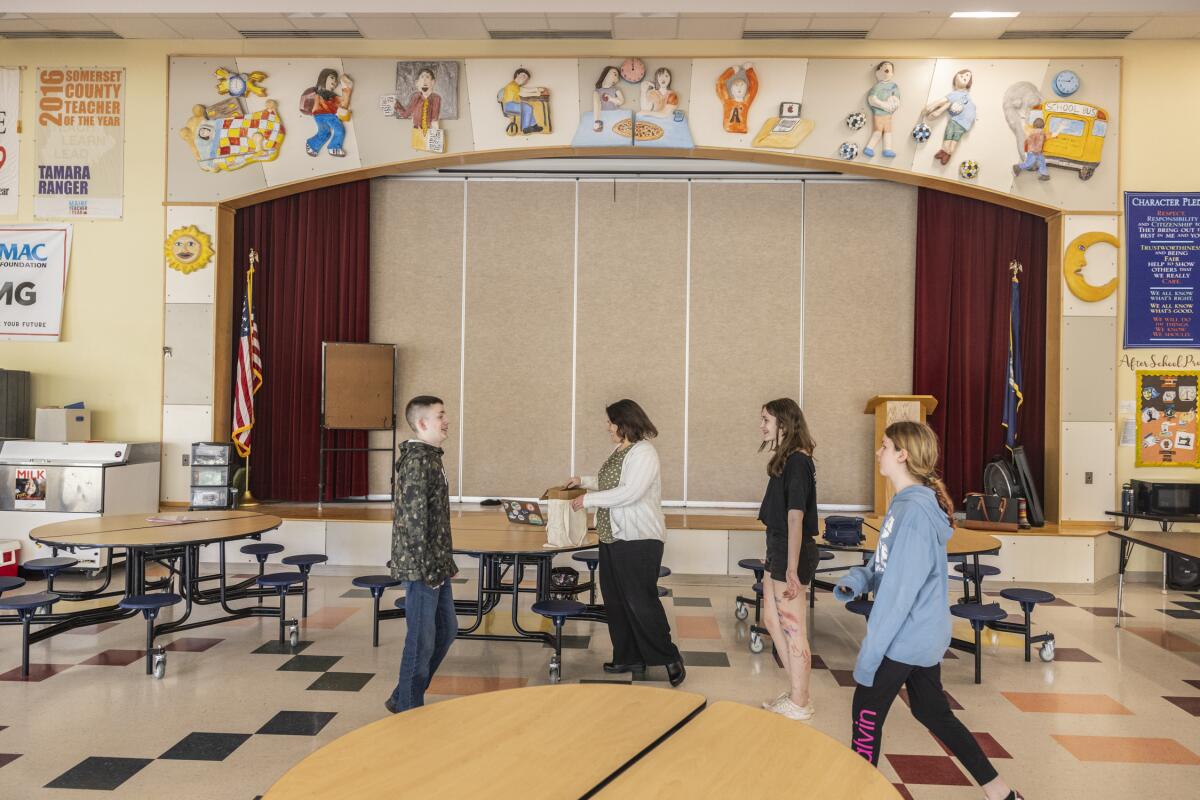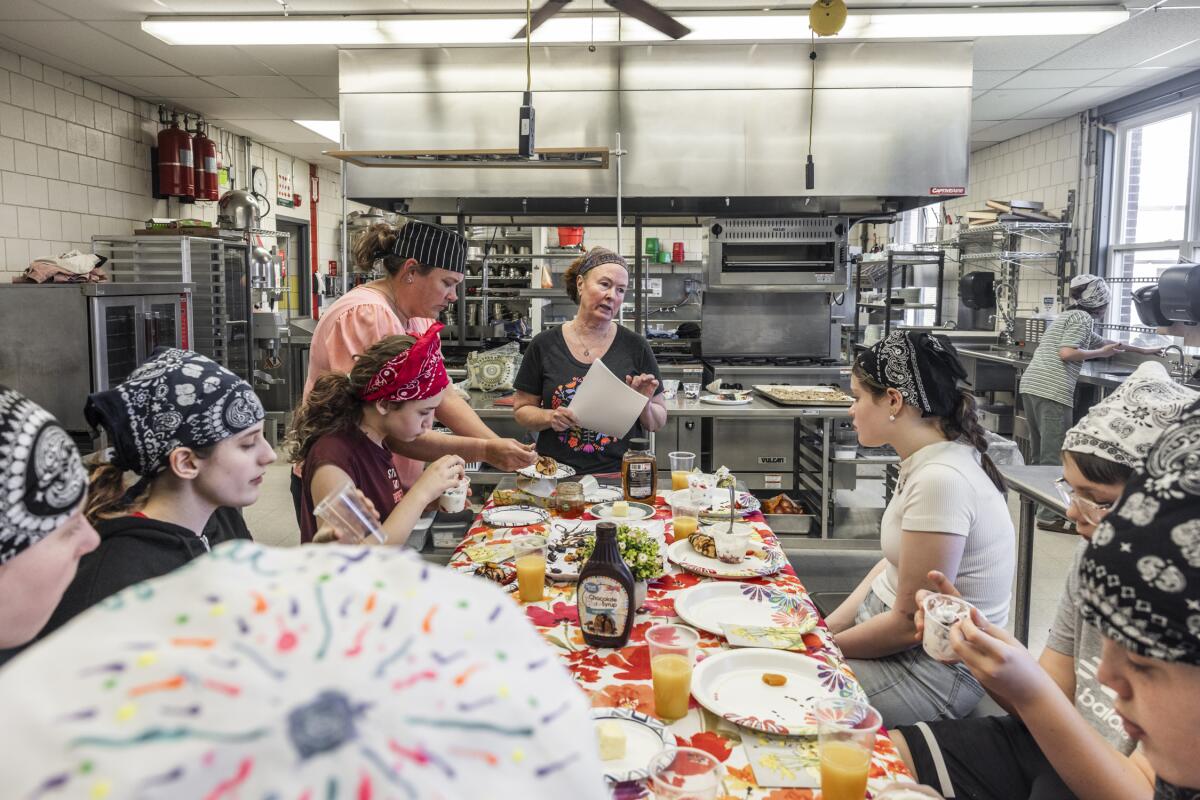NPR has contacted the United States Ministry of Education several times to comment on the federal subsidies proposed for cuts, and the justification behind efforts to reduce the federal role in schools. The civil servants did not respond.
In a previous declaration, Education Secretary Linda McMahon wrote“The budget proposed by President Trump places students and parents above the bureaucracy … We must change the courses and redirect taxpayers to proven programs that generate results for American students.”

Dawn Fickett, director of the scope of MSAD 54, said that the loss of programs after school would be a blow for students in the Skowhegan region, where the program led to academic and others. “Having a place for our youth to be committed, triggering joy and learning, is a great way to keep the kids in our streets and out of problems,” she said.
Hedy Chang, who founded Assist Works, a non -profit national organization that seeks to combat chronic absenteeism in schools, says research has long shown that programs after school can also improve student attendance during school day, among other advantages.
“Programs after school can connect children to necessary resources such as food, nutrition,” she said. “And make sure they are connected to something that engages them, makes them enthusiastic about learning.”
In Maine, schools are also faced Other threats to federal fundingand will see soon school mental health services Limited by federal cuts. Low -income and rural districts like MSAD54, which depend more on federal funds, would be particularly difficult.
“I can hardly imagine our school district without a program after the robust school,” explains Fickett. “I could see him really hinder the progress of our community if we had no safe places and support for our young people, and places that help support their academic success.”
Exhibition to new flavors and experiences
The program of the program of the program after the school of MSAD 54 is one of the many enrichment options for students, but it remains the most popular.
Brenda Madden, a retired chief who has run the club for four years, conducts a lesson on the presentation and decoration of the table. The idea behind the class is to present to students kitchens of different cultures, culminating in the annual food festival that students organize for the wider school community.
“Magic occurs in the kitchen,” explains Madden. By introducing new flavors, kitchens and skills to her students, she says: “It takes the fear of creating magic.”
Dylan Kirk, a seventh year student, who is busy watering croissants with melted chocolate and dried apricots, says he had never thought of combining these flavors to this lesson. “Miss Brenda told me to make them fanciful, so I did my best,” he said, while he presents the dish in the classroom.
Other students share that paprika, stuffed zucchini and clover shakes with chocolate mint are part of the flavors and dishes they had never tried to Madden’s class.
“At the start of their culinary experiences, they said” I want chicken nuggets and fries for supper, “said Fickett. “After a year of cooking with Brenda, they will be able to tell you that they would love to prepare paninis with a variety of cheeses, meats or vegetables; or brownies with rosemary or mint. ”
In addition to meetings with new foods, Madden says that his class is an opportunity to find out about nutrition. “I say to these children, when you get shopping with your parents, instead of buying a bag of chips, which is two to three dollars, look at a fruit that you have never tried before.”
Madden says that there is another additional draw for students of the cooking club: “Children are hungry. They know they are going to have something to eat here, ”says Shes.
This hunger combines with the satisfaction that they Created the meals they can appreciate. “We are still testing our own product,” explains Molly Fitzpatrick, a sixth year student.
Achieve academic objectives while having fun
Before the scope students are divided into their various clubs, they have their noses in books and workheets – it is dedicated to 30 minutes to finish their homework after school.
“In college,” said Fickett, “teachers report that they see a 90% increase in the completion of homework with their children who attend our program.”
Part of what has enabled his program to succeed is to collaborate with teachers of school days to create continuity in the program after school, she explains.
At the level of primary school, Fickett and other staff members provide additional support to the youngest students in order to fill academic gaps early.
Last year, she said: “In our 2nd year kindergarten program, 37 of our 38 students (unaccomplayed) showed an improvement in literacy.” She saw similar gains for elementary higher students.

Chang, attendance at work, says that this type of collaboration can make a big difference. “Students can access additional resources and support, to learn an academic concept or have a different and more practical approach to learning,” she said.
All the clubs of the program after the Fickett school incorporate academic objectives. In fact, this is one of the requirements of the 21st CCLC federal subsidies.
In the Madden cooking club, for example, students practice mathematics by adding, subtracting and multiplying recipes. They achieve scientific objectives, such as the observation of chemical reactions between the ingredients. It is almost as if learning was slipped into pleasure.
At the same time, programs after school also help to develop students’ capabilities to work together, by strengthening non -academic essential skills.

“What Brenda is doing really well is to establish from the start how we work better together as a group, how we communicate, how we solve problems,” explains Fickett. “And it really strengthens these social and relational skills that our young people absolutely need.”
School attendance is also a requirement to follow the program after school. The sixth year Molly Fitzpatrick thinks it’s an intelligent system, “because I will be delighted to go to school on Monday because I don’t want to miss cooking.”
A free and essential service for parents too
The mother of the seventh year Dylan Kirk, Cynthia Kirk, picks him up after having finished her working day as a Skowhegan waste management supervisor. “We work full time. Sometimes I worked several jobs, my husband too, ”she says.
It was a huge advantage for Dylan to participate in the reach – something he did since the program made his debut in 2019.
“He actually experienced a lot of different things that he probably couldn’t do without the program after school,” said Cynthia.
She describes her son as a “practical child” who learns concepts better by practicing them in a tangible way rather than abstract in class. Activities after school allowed him to do this exactly.
“I just like to build things,” explains Dylan, whose club after favorite school is robotics, although the cooking club is a second point.
“He will come home with recipes and will say” Mom, can we do this? ” Can we try this? It was really good, “said Cynthia.
Now Cynthia says she is concerned: “As far as children are concerned, this should be the last on the list of things to cut. So many children need these programs. They need a place to go after school. The daycare is very limited for families after a certain age. ”
Dawn Fickett says that she has already worked to obtain financing from local businesses and other donors to find ways to maintain the program after school in operation.
The life of a child, she says, does not end simply when the dismissal bell rings at school. “In this district, we do not consider school and the continuation as separate … We are an essential element of a child’s school day.”



